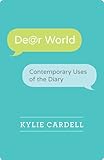Dear world : contemporary uses of the diary / Kylie Cardell.
Material type: TextSeries: Publication details: Madison, Wisconsin : The University of Wisconsin Press, (c)2014.Description: 1 online resource (x, 182 pages)Content type:
TextSeries: Publication details: Madison, Wisconsin : The University of Wisconsin Press, (c)2014.Description: 1 online resource (x, 182 pages)Content type: - text
- computer
- online resource
- 9780299300937
- De@r world [Cover title]
- PN4390 .D437 2014
- COPYRIGHT NOT covered - Click this link to request copyright permission: https://lib.ciu.edu/copyright-request-form
| Item type | Current library | Collection | Call number | URL | Status | Date due | Barcode | |
|---|---|---|---|---|---|---|---|---|
 Online Book (LOGIN USING YOUR MY CIU LOGIN AND PASSWORD)
Online Book (LOGIN USING YOUR MY CIU LOGIN AND PASSWORD)
|
G. Allen Fleece Library ONLINE | Non-fiction | PN4390 (Browse shelf(Opens below)) | Link to resource | Available | ocn898456627 |
Browsing G. Allen Fleece Library shelves, Shelving location: ONLINE, Collection: Non-fiction Close shelf browser (Hides shelf browser)
Where has the personal diary gone--and what forms has it taken--in the digital age? From the diary spaces of reality television and the how-to diary and its audience of self-helpers, in the emerging genre of the graphic diary or the online diaries of sex bloggers, in the published diaries of war correspondents or the urgent personal writing of Arab women under conflict, this book explores a new wave in diary publication and production. It also provides a fresh look at the diary as a contemporary form of autobiography. In Dear World, Kylie Cardell is sensitive to how changes to our notions of privacy and the personal--spurred by the central presence the Internet has come to occupy in our daily lives--impact how and why diaries are written, and for whom. She considers what these new uses of the diary tell us about the cultural politics of self-representation in a time of mass attention to (and anxiety about) the personal. Cardell sees the twenty-first-century diary as a vibrant and popular cultural practice as much as a literary form, one that plays a key role in mass-mediated notions of authenticity, subjectivity, and truth. Dear World provides much-needed new attention to the innovation, evolution, and persistence of a familiar yet complex autobiographical mode. --
Includes bibliographies and index.
Introduction -- A public private self: Diary now -- How to be the authenic you: Therapy, self-help, and the "how-to diary -- The ethics of being there and seeing: Thomas Goltz, Paul McGeough, and the Journalist's diary of war -- The intimate appeal of getting closer: The diary as evidence and testimony in Nuha al-Radi, Riverbend, and Suad Amiry -- Sex, confessioin, and blogging: The online diaries of Belle de Jour and Abby Lee -- Graphic lives: Visual narration and the diaries of Phoebe Gleckner, Bobby Baker, and "The 1000 Journals Project" -- Conclusion.
COPYRIGHT NOT covered - Click this link to request copyright permission:
There are no comments on this title.







